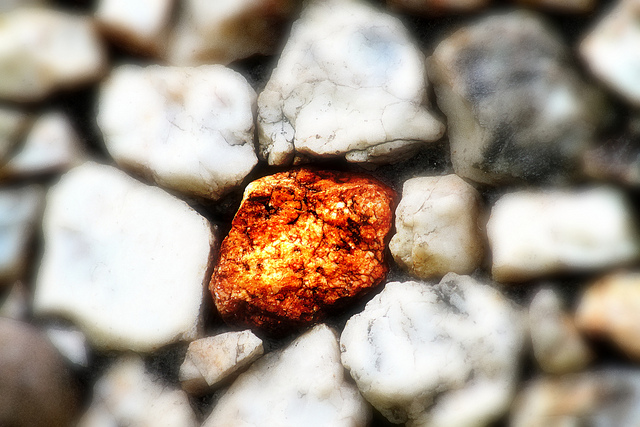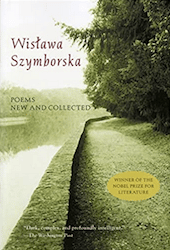
Atop the newel post at the bottom of my Great-Grandma Bessie’s dark oak staircase sat a large, bumpy light colored stone. She had another on a shelf that was broken apart, revealing a sparkling quartz-like interior, a delightful contrast with the blasé outer surface. I don’t recall the name of the stone, though it was likely some sort of geode, and certainly a source of intrigue for a young child, alongside the Mason jar of old buttons and the rusted peanut brittle can that let loose four feet of spring-loaded fake snakes when it was opened by an unsuspecting aunt or uncle.
It is perhaps the promise of such a glittering surprise that makes the speaker in Wisława Szymborska’s “Conversation with a Stone” so maddeningly persistent in his efforts to get past a stone’s front door for a bit of a “look round” the insides.
Conversation with a Stone
I knock at the stone’s front door.
It’s only me, let me come in.
I want to enter your insides,
have a look round,
breathe my fill of you.”
“Go away, ” says the stone.
“I’m shut tight.
Even if you break me to pieces,
we’ll all still be closed.
You can grind us to sand,
we still won’t let you in.”
I knock at the stone’s front door.
“It’s only me, let me come in.
I’ve come out of pure curiosity.
Only life can quench it.
I mean to stroll through your palace,
then go calling on a leaf, a drop of water.
I don’t have much time.
My mortality should touch you.”
“I’m made of stone, ” says the stone,
“and must therefore keep a straight face.
Go away.
I don’t have the muscles to laugh.”
I knock at the stone’s front door.
“It’s only me, let me come in.
I hear you have great empty halls inside you,
unseen, their beauty in vain,
soundless, not echoing anyone’s steps.
Admit you don’t know them well yourself.”
“Great and empty, true enough, ” says the stone,
“But there isn’t any room.
Beautiful, perhaps, but not to the taste
of your poor senses.
You may get to know me, but you’ll never know me through.
My whole surface is turned toward you,
all my insides turned away.”
I knock at the stone’s front door.
“It’s only me, let me come in.
I don’t seek refuge for eternity.
I’m not unhappy.
I’m not homeless.
My world is worth returning to.
I’ll enter and exit empty-handed.
And my proof I was there
will be only words,
which no one will believe.”
“You shall not enter, ” says the stone.
“You lack the sense of taking part.
No other sense can make up for your missing sense of taking part.
Even sight heightened to become all-seeing
will do you no good without a sense of taking part.
You shall not enter, you have only a sense of what that sense should be,
only its seed, imagination.”
I knock at the stone’s front door.
“It’s only me, let me come in.
I haven’t got two thousand centuries,
so let me come under your roof.”
“If you don’t believe me, ” says the stone,
“just ask the leaf, it will tell you the same.
Ask a drop of water, it will tell you what the leaf has said.
And, finally, ask a hair from your own head.
I am bursting with laughter, yes, vast laughter,
although I don’t know how to laugh.”
I knock at the stone’s front door.
“It’s only me, let me come in.”
“I don’t have a door, ” says the stone.
By rights, I think I should not like this poem. As I read, I had that infuriating sense one can have when, well, having a conversation that feels like talking to a rock. For each rejection by the stone, the speaker retools his approach and advances again. And as irritating as I find that, it makes me love the poem. It does its job well in evoking a strong response, whether or not it is a response I favor.
I find myself asking questions as I read, thinking I might know the answer, only to have it dashed in the next stanza. Why is the speaker so intent to go in? Could the speaker be any more self-focused in his pursuit of entry? (And impatient?) Does the speaker intend to give anything to the stone, or once inside, will it only be a taking, an insistence to be allowed to “breathe my fill”? Why is the stone closed so tightly? Why does he demand participation from the speaker, yet refuse to be touched by the speaker’s mortality? The stone’s argument that it can be broken and still not opened—is this a simple statement of fact or is it a defiant challenge? Go ahead, break me. You’ll see.
And what of the door? Is there one or not? Does the speaker imagine it, or is it really there? Is there a door and the stone doesn’t know it? Or does the stone deny it? Or does it truly not exist? If there is no door, then why not say it at the first, rather than the desperate “I give up” declaration at the end? And if there is a door, what purpose does it serve—to let a visitor in, or to keep one out?
Answers are not forthcoming. But that the questions themselves came as such an avalanche is as rewarding as the shimmering quartz inside the unnamed stone at my grandmother’s home.
Getting a Word in Edgewise After Szymborska’s “Conversation with a Stone”
I’m reading poems by Polish poet Wisława Szymborska every day in April as part of our National Poetry Month Poetry Dare, and writing my own poems in response. I’ve read little, if any, of her work before, and that’s really the point of the dare: to spend time with a poet that is unfamiliar, and see what happens. Are you reading a particular poet each day? Maybe you are reading an eclectic mix you’ve put together, or the daily offerings of Every Day Poems. What do you find challenging about the daily practice or about your poet? What are you most enjoying? Share with us in the comments. And if you wrote about the dare on your blog, leave us a link.
Read about the National Poetry Month Poetry Dare
Browse more Wisława Szymborska
Photo by Guy Renard, Creative Commons via Flickr. Post by Will Willingham.
______________________
Dare yourself to read a poem, every day, starting today.
Buy a year of Every Day Poems, just $5.99
Read a poem a day, become a better poet. In April, we’re exploring the theme Cheese.
- Earth Song Poem Featured on The Slowdown!—Birds in Home Depot - February 7, 2023
- The Rapping in the Attic—Happy Holidays Fun Video! - December 21, 2022
- Video: Earth Song: A Nature Poems Experience—Enchanting! - December 6, 2022


Alexandra Barylski Stott says
Love that you are reading Szymborska for National Poetry Month! She is one of my faves.
Checkout my kudos to Tweet Speak, a Szymbroska poem and my response to her poem on my blog: http://ofearthandobjects.blogspot.com/
Elizabeth marshall says
Such a treat to see you here. Welcome to this community of poets. Looking forward to reading your post tomorrow.
Signed,
Elizabeth, poetry barista
Part of the Tweetspeak Poetry team
Will Willingham says
Just getting acquainted, but appreciating her work very much.
Love “Teenager” which you excerpted in your post. 🙂
L.L. Barkat says
Your poem title made me laugh out loud! Perfect response to Szymborska’s.
I think the questions contain their own answers, which is pretty cool. But, like good questions always do, these are the kind that don’t dictate the answer that anyone might think they contain. They are delicious questions. And I’m glad you asked them.
Will Willingham says
They do and they don’t. I would find myself formulating an answer, then read the next stanza and have it go to pieces. I found myself irritated with the speaker for the relentless advancing, then annoyed at the rock for answering in ways that left an opening for the next advance.
Fascinated with the poem, and my own reaction to it. 🙂
Maureen Doallas says
This poem, a discussion of which could last hours, makes me laugh, because the ending is perfect.
Could there be a better metaphor than stone? In Szymborska’s hand, the stone indeed gets the last word and proves so much wiser than the insistent fool himself. The question of what is real – interior vs exterior, what we show and hide, experience vs memory, what we see and miss seeing – is profound.
Great choice to highlight for the Poetry Dare.
Will Willingham says
I think the discussion could go on for hours and still not resolve, Maureen. As I wrote this one out, I found myself making marginal notes, which I don’t normally do, but there’s a list of questions it provoked as long as my arm (which is long). 😉
And yes — so many ways to look at the metaphor, and I’d add animate vs inanimate, mortal vs immortal.
Maureen Doallas says
Oh, I agree that there is no particular resolution; that’s one reason I like this poem. The reader is in on the game before the narrator, and there’s some irony in that if we accept that the narrator is human and just can’t “get” how inexplicable some things, like nature, are, and insistently continues to know what can’t be described.
Maureen Doallas says
… insistently continues to try to know what can’t be described.
Megan Willome says
As I’ve said, Laura Brown and I are doing Kevin Young’s “Book of Hours.” Doing a collection reveals patterns across the poems, echoes. I’m reading more carefully than emotionally.
SimplyDarlene says
but the outside
now of two…
Oh bother! says The
Pooh, as he rolls
an unwanted stone
off his wooden shanty
porch.
With ho-hum bothersome
grumbling
Eeyore mumbles low
head-cracking talk
because he stubbed his
hoof-y toe on the stone.
Rabbit & Owl calculate
wheelbarrows, catapults; the duo
invokes rubber
bands to launch the stone
out of the way. They fail and
commiserate with math-less,
empty dealt hands
and drink tea, spiced with the vapors.
Piglet, all pink and
stripy, skittering about in his fear
some underwear. Scrunches
up brow and simply turns
the stone’s cotton candy
insides
out. She’s pink
like me.
“Oh Pooh! Come
and see what I’ve got
for you! And bring
your strange friend,
the man who talks to
stones.”
Donna says
I adore your poem in response… and this last bit “You won’t see
the the inside of a stone,
but the outside,
now of two.”
It struck me with it’s elegance and related to what I was envisioning as I read the conversation… and so, I respond to your response in what else but a poem?
the stone did split
and split
endlessly split
now renamed
sand
countless doorless grains
closed tight
pressed
and heated
endlessly craved
now renamed
glass
Donna says
(I was practicing with spacing like I have seen in Adrienne Rich’s work but it disappeard… after endlessly and before split.
endlessly – – – split)